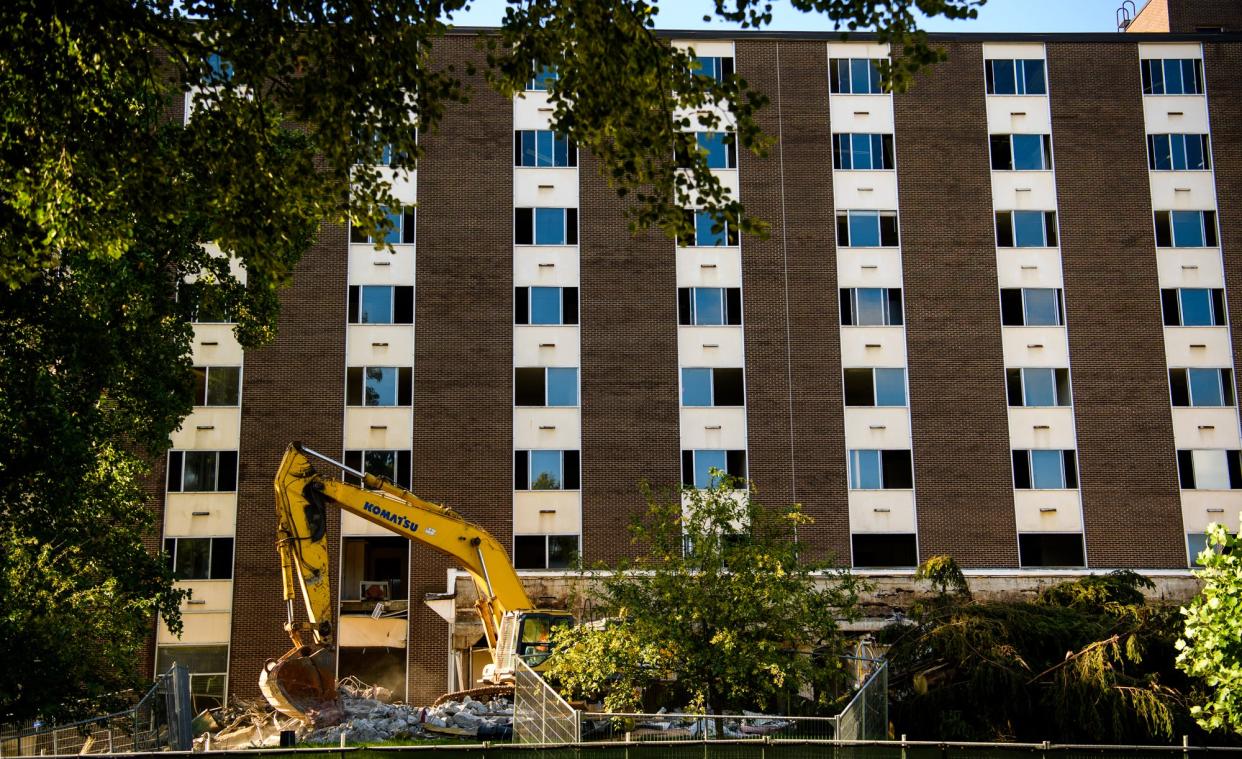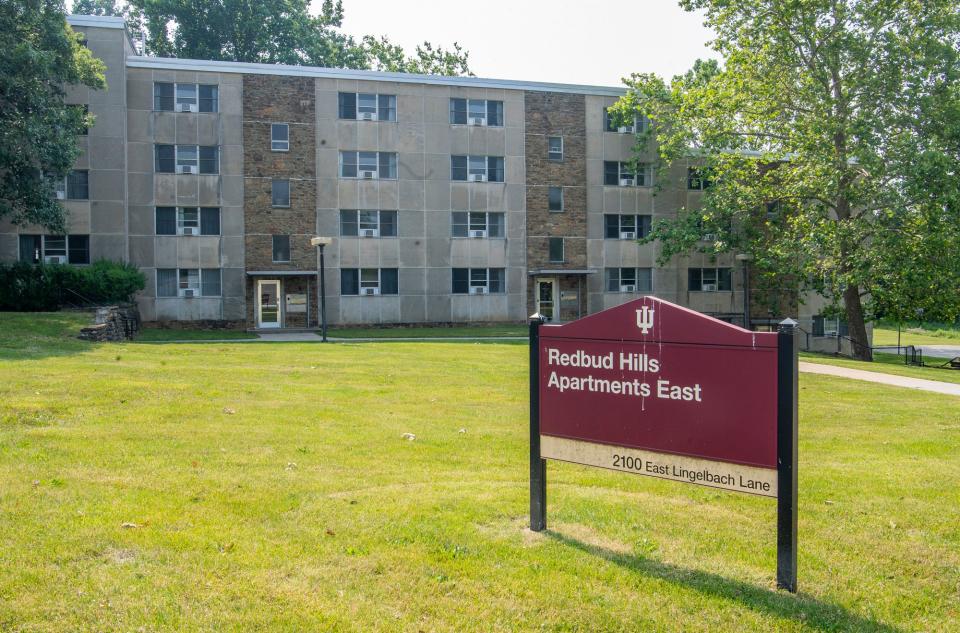Critics: IU's new housing project too expensive for intended tenants: grad students.

Editor's note: This post has been updated with comments from David Daleke, dean and vice provost for graduate education and health sciences at Indiana University.
Indiana University’s plan to build an $81-million downtown Bloomington apartment building targeted for graduate students is getting some pushback from critics who say the prices, which will exceed $1,300 a month, are way too high for most grad students.
The income required to afford an apartment at that price is roughly $52,000 per year, if the occupant wants to spend no more than 30% of their income on housing. The federal government considers people “rent-burdened” if they spend a greater share of their income on housing.
That income is “wildly out of range” for most graduate students, given that their minimum stipend is $22,000, said Chelsea Brinda, a doctoral student and co-chair of a university working group for graduate student housing.
The university’s trustees approved the project Thursday afternoon. The six-story, 158-unit building is slated for the site that formerly housed the Poplars Building, which IU tore down last summer. The university said Friday it expects the facility to open for the 2026-27 academic year.
End of an era: Poplars Building coming down
“Unit rental will be prioritized for IU graduate students, who were the primary occupants of on-campus facilities that were retired after having exceeded their useful life,” the university said on its website Friday.
IU also recently announced it would demolish Redbud Hill Apartments North and East next spring. The university said the buildings had accumulated significant deferred maintenance and it did not consider renovation a feasible option. The site joins Evermann, Banta, Bicknell, Hepburn and Nutt apartments as campus housing buildings that have been identified for demolition.

The university said it wants to provide “sufficient housing to graduate students and other members of the IU community.” After graduate students, the new facility will be assigned to faculty, staff, employees, undergrads and visiting scholars.
However, Deborah Cohn, professor of Spanish and Portuguese and co-chair of the graduate student housing working group, said the prices for the new units also would be difficult for university staff to afford.
Cohn provided a list of local apartment units and their cost, according to which, units on the Bloomington campus are already more expensive than some off-campus apartments. The origin of that list was not immediately clear and its accuracy could not be immediately verified.
Brinda and Cohn also urged the university to conduct a survey to determine graduate students’ needs and to include students in discussions about housing.
IU spokeswoman Barbara Brosher declined to answer questions about the number of bedrooms in the units, how graduate students would be able to afford the units, whether the university planned to build additional student housing and which of the working group’s recommendations the university planned to implement.
She also declined to confirm how much the units cost. The Herald-Times planned to attend Thursday's meeting of the IU facilities committee, but the meeting had begun — and ended — before its scheduled start time. According to a report from WFIU, the new units are to cost between $1,315 and $1,834.
Brosher also declined to answer what prompted the university to change its mind about the use of the Poplars site. A year ago, the university planned to use the site as green space.
She also declined to answer whether Thomas Morrison, vice president for capital planning and facilities, would be available for an interview.
David Daleke, dean and vice provost for graduate education and health sciences, said via email, "Increasing housing inventory and prioritization of graduate students through this project is one step in addressing this complex issue.
"The housing subcommittee of the IUB 2030 strategic plan identified other actions that could be taken and we will continue to follow through on them. For example, IU Real Estate prioritized graduate students when filling their inventory for this fall," wrote Daleke, who also is a professor of biochemistry and molecular biology.
Daleke also said that providing graduate students with more money — through increased stipends and elimination of fees — can help.
"Finally," he wrote, "we also know that additional housing in Bloomington can open up more affordable inventory within the larger housing market."
How should housing for Indiana University graduate students be addressed?
Brinda had previously criticized the university’s response to the working group’s recommendations, none of which, she said, made it into the university’s overall strategic plan.
The group identified four objectives and 19 strategies to achieve them, which included:
Review and evaluate the current status and costs of university and private housing options.
Create a help-desk or position within the graduate ombuds office to assist graduate students with aspects of the housing process.
Replace demolished graduate units with appropriate units … to create more space for graduate students to live on campus.
Explore building and/or purchasing multi-family units off-campus.
Provide students who accept offers to IU with accurate information about housing options.
The group said housing plays a “crucial part” in the graduate student experience and affects their “sense of belonging, community and connection to campus.” The group also said “housing-related issues may create or alleviate significant stress and have an impact on student success.
“Housing options and costs may additionally give the campus a significant competitive (dis)advantage when trying to recruit new graduate students,” the group said. “The recent and forthcoming demolition of several IU buildings housing graduate students, as well as the dramatic increase in rent in Bloomington over the past year alone, have brought these issues to the fore and make it imperative that the campus address the issue of graduate housing right away.”
For the Poplars project, IU will enter into a 60-year lease agreement with BPIU Partners LLC, which will design, construct and finance the building. The lease could be extended by two 10-year terms. The university said the property will be "operated and maintained by Buckingham Management LLC, an affiliate of BPIU Partners."
According to filings with the Indiana Secretary of State’s office, BPIU was established in 2015 by Andrew I. Klineman, general counsel for Indianapolis-based real estate investment firm Buckingham Companies. According to the latest SoS filing, BPIU’s registered agent is Corporation Services Co., based in Indianapolis at the same address as the Hackman Hulett law firm.
Boris Ladwig can be reached at bladwig@heraldt.com.
This article originally appeared on The Herald-Times: Critics: Indiana University's housing project too costly for students

